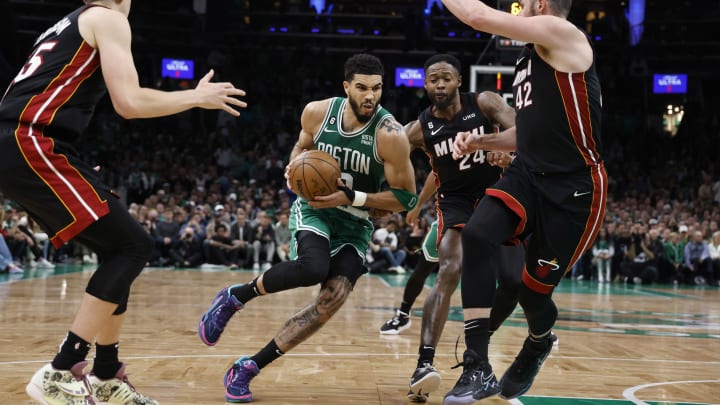Three Questions That Will Define the Rest of the Celtics-Heat Series

Whoa! After the Heat took a shocking 3–0 lead in the conference finals, the Celtics have rallied back to shorten the gap to 3–2, with an incredibly pivotal Game 6 taking place in Miami on Saturday. The tenor of the series has changed quite a bit since the Heat took the commanding lead, with Boston looking every bit as good in the last two games as it did during the regular season. (And conversely, Miami looking every bit as average as it did before the playoffs.)
Here are three big questions to keep an eye on as we barrel toward the Game 6 tilt.
Who will win the three-point battle?
It’s always a bit reductive to boil down every playoff series to the three-point line. At the same time, the Heat and Celtics have pushed that concept to its logical extreme in the East finals. In the first three games of the series, Boston shot 31-of-106 from three, a 29.2% clip. In the last two, the Celtics have shot 34-of-84 from three, a robust 40.5%. Meanwhile, the Heat were 44-of-92, a 47.8% conversion rate, from deep in Games 1 through 3. In the last two, Miami is 17-of-55, a meager 30.9%. Basically, in Games 1 through 3, the Heat were plus-39 from three. In Games 4 and 5, the Celtics were a whopping plus-51 from deep.
Miami has to be fearful here, because the swing in three-point shooting over the last two games more closely resembles what these teams looked like in the regular season. Boston’s three-point shooting numbers may look gaudy, but that’s been the team’s identity this entire year. On the other hand, the Heat’s hot shooting has been one of the inexplicable developments of the postseason. The advantage, at least on paper, is Boston’s moving forward.
(In addition to the threes, offensive rebounds and turnovers have also played a major role in Boston’s wins. Miami won the turnover battle by nine in the first three games. Over the last two, the Celtics have 12 fewer turnovers than the Heat. Boston also grabbed as many offensive rebounds (19) in Games 4 and 5 as they did in Games 1 through 3.)

How will Erik Spoelstra adjust his rotation?
In large part due to an injury to Gabe Vincent, Spoelstra introduced swingman Haywood Highsmith to the series in Game 5. After playing seven minutes of garbage time in the first four games, Highsmith logged 36 minutes of action Thursday. There’s an argument to even start Highsmith in Game 6. His perimeter defense is a bonus, and putting him in the starting lineup would prevent the Celtics from attacking Kevin Love in high pick-and-rolls.
In this scenario, Love can take over the backup center minutes from Cody Zeller, whose minutes have been … adventurous in this series. While Love would get attacked in a similar manner to Zeller on defense, he would at least provide some much needed spacing on the other end of the floor. And Spo could keep the rest of his rotation the same, assuming Vincent returns from injury, by keeping Kyle Lowry and Caleb Martin on the bench.
After getting carved up the last few games, the Heat need to find a counter to Boston on the perimeter. Highsmith would add that while keeping the rest of the rotation in place. Miami can’t afford for the Celtics to find a rhythm offensively to start Game 6. Taking its weakest defender off the floor could go a long way.
Watch the Celtics with fuboTV. Start your free trial today.
Can Playoff Jimmy go full Playoff Jimmy?
One of the big keys entering this series was always going to be Jimmy Butler’s success attacking Boston’s switches. In the first two games of the series, Butler dominated in isolations, picking on players like Payton Pritchard, Grant Williams and Derrick White. In Game 3, he facilitated a bit more after the Celtics started putting more bodies in the paint. In Games 4 and 5, Butler hasn’t looked sharp, shooting a disappointing-for-him 45.2% from the field.
Boston’s strategy seemingly has been to force Butler into tough shots and live with the results. That hurt the Celtics in the first couple of games, but Jimmy hasn’t been able to make them pay in the last couple. Combined with Boston’s revived commitment to swarming the paint and creating takeaways, the Heat’s offense has been stuck in the mud since going up 3–0.
Simply put, Butler has to win his one-on-ones in Game 6. It’s the Heat’s best offense. And then he can leverage the help to get others going. As stuck as Miami has looked at times, there’s at least some precedent for Butler going off against Boston. In Game 6 of this matchup last year, Jimmy put up 47 on the road to save Miami’s season. That’s the Butler the Heat need Saturday.
